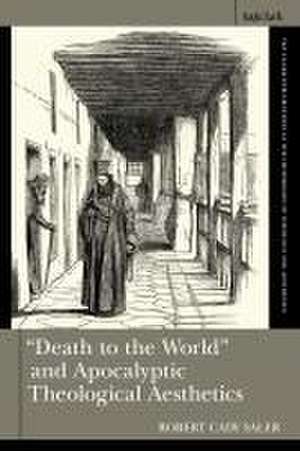"Death to the World" and Apocalyptic Theological Aesthetics: T&T Clark Explorations at the Crossroads of Theology and Aesthetics
Autor Robert Cady Saleren Limba Engleză Hardback – 29 mai 2024
Preț: 508.22 lei
Preț vechi: 729.90 lei
-30% Nou
Puncte Express: 762
Preț estimativ în valută:
97.25€ • 101.79$ • 80.94£
97.25€ • 101.79$ • 80.94£
Carte tipărită la comandă
Livrare economică 01-15 aprilie
Preluare comenzi: 021 569.72.76
Specificații
ISBN-13: 9780567704450
ISBN-10: 0567704459
Pagini: 160
Dimensiuni: 156 x 234 mm
Greutate: 0.38 kg
Editura: Bloomsbury Publishing
Colecția T&T Clark
Seria T&T Clark Explorations at the Crossroads of Theology and Aesthetics
Locul publicării:London, United Kingdom
ISBN-10: 0567704459
Pagini: 160
Dimensiuni: 156 x 234 mm
Greutate: 0.38 kg
Editura: Bloomsbury Publishing
Colecția T&T Clark
Seria T&T Clark Explorations at the Crossroads of Theology and Aesthetics
Locul publicării:London, United Kingdom
Caracteristici
Demonstrates how this movement can be helpfully understood within a broader context of antimodernist subcultures both within American Eastern Orthodoxy and within American culture more generally
Notă biografică
Robert Saler is Associate Professor of Religion and Culture, Executive Director of the Center for Pastoral Excellence and the Lilly Endowment Clergy Renewal Programs at Christian Theological Seminary, USA.
Cuprins
IntroductionMarketplace and IdentityChapter 1"Monks are the True Punks:" Justin Marler and the Beginning of the MovementChapter 2Reaching a Lost Generation: The Zine BeginsChapter 3Revival and InfluenceChapter 4Whose Authority to Fight?Chapter 5Theological Potential(S)ConclusionsBibliographyIndex
Recenzii
Deftly weaving together theological and cultural critique, Robert Cady Saler offers us the first interdisciplinary study on the Death to the World movement and its attached affective eschatological politics of rebellion and belonging. Through interviews with group leaders, textual analysis, and theological interrogation, Saler wrestles with the relationships among music, consumerism, religion, and identity politics, asking provocatively: Can rebellion be purchased? An essential read for understanding the emphasis on apocalyptic politics and capitalism that animates contemporary Christianity in the United States, Saler reminds us of why Orthodox Christianity should be central to the study of American religion(s).
Saler carefully navigates an intricate blend of personal admiration, frustration, and concern regarding a niche movement within the Eastern Orthodox community in the United States. His contemplative approach toward both the virtues and the troubling elements of Death to the World stands as a rare gem amidst an era dominated by bitter conflicts between competing sociopolitical and religious ideologies. The book's deliberate and balanced analysis sets a notable standard for the current age of upheaval and passionate discord. Within its pages, the text illuminates how conspiracy theories have impacted not only conservative Evangelical Christianity in the U.S. but are also seeping into an Americanized fringe faction of Eastern Orthodoxy. Saler provides a compelling yet disquieting case study that is meticulously researched and full of fascinating excerpts from primary source material.
This book asks a compelling question: Can tradition be counterculture, and can rebellion be Orthodox? Saler's innovative and eloquent analysis of an important movement in the history of Orthodox Christianity in America reveals both the vitality and danger of radical religious critique of modernity, and will be of great interest to anyone asking what it means to seek the truth amidst the despair and confusion of modern life.
Saler carefully navigates an intricate blend of personal admiration, frustration, and concern regarding a niche movement within the Eastern Orthodox community in the United States. His contemplative approach toward both the virtues and the troubling elements of Death to the World stands as a rare gem amidst an era dominated by bitter conflicts between competing sociopolitical and religious ideologies. The book's deliberate and balanced analysis sets a notable standard for the current age of upheaval and passionate discord. Within its pages, the text illuminates how conspiracy theories have impacted not only conservative Evangelical Christianity in the U.S. but are also seeping into an Americanized fringe faction of Eastern Orthodoxy. Saler provides a compelling yet disquieting case study that is meticulously researched and full of fascinating excerpts from primary source material.
This book asks a compelling question: Can tradition be counterculture, and can rebellion be Orthodox? Saler's innovative and eloquent analysis of an important movement in the history of Orthodox Christianity in America reveals both the vitality and danger of radical religious critique of modernity, and will be of great interest to anyone asking what it means to seek the truth amidst the despair and confusion of modern life.

